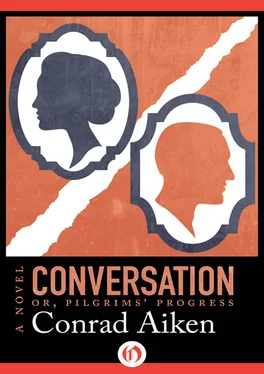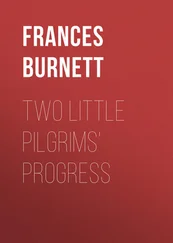“The water, by the way,” she said, “is very low.”
“Why didn’t you tell me?”
“I thought you knew.”
“Of course not! I suppose it was Buzzer’s bath—”
“And don’t forget, either, that I did a whole morning’s washing! The cesspool was flooded again.”
“The devil it was!”
“Yes. I called up Binney. He’s coming in the morning. He says we’ll probably need to have an extra one put in.”
He struck the one note again, listened to it idly, wondered for a moment if the candle flames could feel the vibration — but no, they were perfectly still, rose motionless in the quiet room, as steady and beautiful as peacock’s eyes, and the room around them as attentive — with its chairs arranged demurely against the walls of white wood, the lustrous mahogany lowboy, the Chinese embroidery of birds and dragons — as if it existed for them alone. Peace — peace — peace —the crickets were singing in the moonlight outside — the rhythmic incantatory sound was everywhere, came into everything, saturated everything, like a mist. Another night like this, poor devils, and they’d be singing a different tune. Was it love? Was it defiance? Or just a sort of mesmerism, a subtle electric response — or spiritual, even — to the earth itself? Exactly like himself and Enid. A mere sidereal response.
In the kitchen, under the luminous whitewashed rafters, Enid had turned on the tap, was rinsing the dishes, shaking the water off her hand. He pulled the screen door towards him, caught it against his foot, and said:
“Well, for goodness’ sake, why so secretive, Ee? Why not tell a fellow!”
“Your door was shut, so I assumed you were painting.”
“Damn. And just as I’ve finally got some grass to grow.”
He stepped into the bright sea of moonlight, feeling for all the world as if positively it might lift him off his feet, float him up over the roof top, over the trees, and went slowly to the white-shingled pump house behind the kitchen. The old w.c. A good idea, that had been, moving it from the back of the yard, and turning it into a pump house — one more example of the unwearying adaptability of nature. After all, too, the function was roughly the same, if a shade more refined. And those squashes that he had grown on the former site, the former unsavory site — those man-eating squashes — by god, would anybody ever forget them? They hadn’t been squashes at all, they had been saber-toothed tigers. And leaves the size of howdahs, or palanquins, or something.… In the cool dark, he stooped toward the compact little engine, fitted the crank handle to it, spun it, spun it again. It caught, coughed, wheezed, then gave three barks in rapid succession and was off.
“Like a lamb,” he said. “Like a lamb!”
The pump shaft groaned musically in the bricked well below him, he heard the first chuckle of flowing water from underground, the indicator over the kitchen sink would be beginning to fidget and dance; but averting his eyes from the thought of the new cesspool, as from the three ghostly boxes of lilacs which lay like coffins on the lawn, he averted his attention from all this as well. Damn. And doing a whole morning’s washing. And not bothering to tell him about it, just ordering Binney herself. And George. And Nora. And Jim Connor. And the bills — the next thing would, of course, be the bills. The butcher, the baker, the candlestick maker. It was all becoming a colossal, an overwhelming joke, a sort of decuman wave of joke, which was piling up to sweep away everything — himself, Enid, Buzzer, the house — everything. In fact, it was ceasing rapidly to be a joke at all. Peace — peace — peace —sang the crickets. Peace? The hell you say, he thought. We ask for peace and they give us a stone. If indeed even a stone. They give us nothing.
“I suppose you couldn’t bear ,” Enid said as he opened the door, “to lend me a hand with these few dishes.”
“I don’t know whether I can bear it, if you choose to put it like that, but I will.”
The challenge again — her eyes flashed handsomely at him, with something that was almost like admiration, and returned to the steaming dishpan, the Himalaya of soft suds in which she was waggling the dish mop. She was humming a little, under her breath, as she always did when she was preoccupied, or tired, or annoyed — tonelessly, tunelessly — a charming and pathetic sing-song which always tickled him, and endeared her to him. No ear for music at all — or was it that she was practicing the Chinese whole-tone scale? Very modern and polychromatic, he had often told her, and written, as it were, without signature. The indicator danced in its dial over the sink, from the pipes came the regular half-musical joog — joog — joog of the pumped water pressing its way everywhere, to every corner of that elaborate arterial artifice of pipes, to every tap, and into the cold heart of the great tank buried underground. But no, of course not, it was the engine that was the heart.
“And is that all?”
“That’s all. I’ll be in in a minute. And thank you.”
“Don’t mention.”
Her pink sleeves rolled back to the elbows, she reached bare-armed to toss a checkered cloth over the clothesline which stretched across the kitchen, and almost simultaneously, as he entered the dining room, he heard something thump heavily on the floor overhead, in Buzzer’s room. He stood still and listened.
“Something must have fallen, upstairs,” he said.
“Probably the doll.”
“She didn’t have a doll.”
“Well, why don’t you go and see! For heaven’s sake, Tip, why do you have to be so helpless!”
“Helpless!”
Helpless.… He lifted a candle from the dinner table, shielded it with one hand, and went quietly up the narrow stairs to the second floor. The upper hall was ablaze with moonlight. A great splash of it lay on the rugless floor and halfway up the wall, it poured through the low window — and to stand there, with his embarrassed candle, was exactly like being inside a camera during a time exposure. Must be what a film feels like, he thought, when you open the shutter: a sensation of flooding. Every cranny indecently exposed: or is it the world that’s exposed—? Helpless ! He said it aloud as he opened Buzzer’s door; and there was Buzzer, standing bolt upright in the middle of the floor beside her bed, her eyes closed, her hands still crumpled against her cheek in the attitude of sleep. Yes, how extraordinary, she was fast asleep. She swayed a little, gropingly, as if trying to find something to relax against — how lovely, like something growing at the bottom of a stream, rooted among pebbles, wavering but tethered! He put the candle on the chair.
“Well, of all the nerve,” he said. “What do you think you’re doing, floating round in the moonlight like this! Aren’t you ashamed?”
“Mmm,” she said.
“I should think so. I suppose you fell out, eh?”
“Mmm,” she said.
“And had the sense not to wake up.”
“Mmm.”
“Well, I congratulate you. Now just stay asleep, and I’ll put you back, and you’ll never know the difference, see?”
She murmured against his neck, his cheek, as he lifted her back into bed, but she was already receding, she was already gone, and the firm little face, on the pillow, instantly averted itself into its chosen dream. What shape did she make of it? What shape was her world? What shape did she make of himself, his hands that touched her, the night sounds, the moon-maddened crickets? Ah, they were all there, in her dream, as a wonderful and forever-sustaining music, an unfailing love — it was the world as it should be, but as it so seldom, or so briefly, remains. Or were there terrors as well—? Yes, even here there were terrors. But fleeting, already dissipated, gone. Peace — peace — peace —sang the crickets, and here, at any rate, they were quite right. But downstairs—!
Читать дальше












